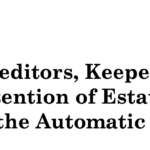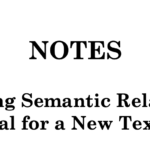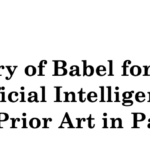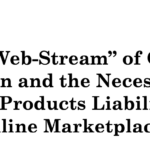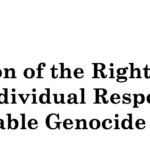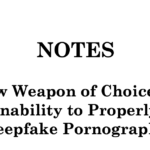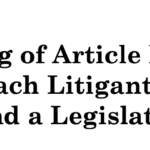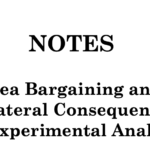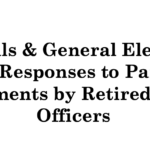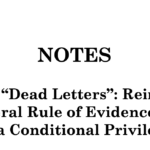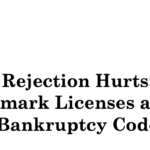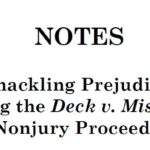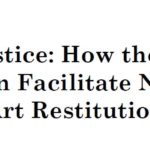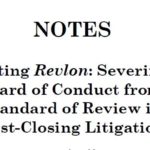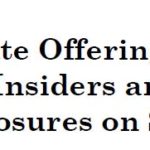Notes Category
Creditors, Keepers: Passive Retention of Estate Property and the Automatic Stay
Apr. 20, 2021—Caitlin M. McAuliffe | 74 Vand. L. Rev. 829 (2021) | The automatic stay provision is one of the most important provisions in the Bankruptcy Code. Until recently, however, it has remained unclear if passive retention of property of the bankruptcy estate must be immediately turned over to the debtor under the automatic stay provision....
Measuring Semantic Relatedness: A Proposal for a New Textual Tool
Mar. 24, 2021—Katherine A. Cohen | 74 Vand. L. Rev. 483 (2021) | Judicial decisions, statutes, constitutions, sentencing guidelines, and ERISA-related documents have at least one thing in common: at a molecular level, the laws are all composed of words. The scientific study of linguistics, particularly the field of semantics, analyzes what words mean and how they...
The Library of Babel for Prior Art: Using Artificial Intelligence to Mass Produce Prior Art in Patent Law
Mar. 24, 2021—Lucas R. Yordy | 74 Vand. L. Rev. 521 (2021) | Artificial intelligence is playing an increasingly important role in the invention and innovation processes of our society. To date, though, much of the academic discussion on the interaction of artificial intelligence and the patent system focuses on the patentability of inventions produced by artificial...
The New “Web-Stream” of Commerce: Amazon and the Necessity of Strict Products Liability for Online Marketplaces
Jan. 26, 2021—Margaret E. Dillaway | 74 Vand. L. Rev. 187 (2021) | Technology company Amazon has actively transformed into an e-commerce giant over the last two decades. Once a simple online bookstore, Amazon now boasts an ever-expanding identity as global cloud computing provider, major player in artificial intelligence, brick-and-mortar grocery store, and producer of original video...
Evisceration of the Right to Appeal: Denial of Individual Responsibility as Actionable Genocide Denial
Jan. 26, 2021—Jennifer E. King | 74 Vand. L. Rev. 221 (2021) | Tensions arise during litigation in the international criminal justice system between the practice of the international criminal tribunals, domestic laws, and policy decisions of United Nation (“UN”) Member States. One such tension arises between domestic genocide denial laws, which typically criminalize denial of genocide...
“The New Weapon of Choice”: Law’s Current Inability to Properly Address Deepfake Pornography
Oct. 19, 2020—Anne Pechenik Gieseke | 73 Vand. L. Rev. 1479 (2020) | Deepfake technology uses artificial intelligence to realistically manipulate videos by splicing one person’s face onto another’s. While this technology has innocuous usages, some perpetrators have instead used it to create deepfake pornography. These creators use images ripped from social media sites to construct—or request...
The Standing of Article III Standing for Data Breach Litigants: Proposing a Judicial and a Legislative Solution
Oct. 19, 2020—Devin Urness | 73 Vand. L. Rev. 1517 (2020) | Data breaches are not going away. Yet victims still face uncertainty when deciding whether and where to file cases against companies or other institutions that may have mishandled their information. This is especially true if the victims have not yet experienced a financial harm, like...
Plea Bargaining and Collateral Consequences: An Experimental Analysis
May. 26, 2020—Carlie Malone | 73 Vand. L. Rev. 1161 (2020) | The overwhelming majority of convictions in the United States are obtained through guilty pleas. Many of these guilty pleas are a product of plea bargaining, where a defendant enters a guilty plea in exchange for some form of official concessions. Despite its prominence, plea bargaining...
Generals & General Elections: Legal Responses to Partisan Endorsements by Retired Military Officers
May. 26, 2020—Hannah Martins Miller | 73 Vand. L. Rev. 1209 (2020) | Retired generals and admirals of the U.S. military appear to be endorsing partisan political candidates in greater numbers, with more visibility. This Note argues that the practice represents a clear danger to civilian control over the military and weakens military effectiveness. It explains that while...
Reviving “Dead Letters”: Reimagining Federal Rule of Evidence 410 as a Conditional Privilege
Apr. 20, 2020—Peter G. Cornick | 73 Vand. L. Rev. 857 | Though understudied relative to its fellow specialized relevance rules, Federal Rule of Evidence 410 protects a crucial element of the criminal justice system: plea negotiations. As written, the rule prevents the admission of evidence gathered during plea discussions, which helps assure criminal defendants that their candid...
Rejection Hurts: Trademark Licenses and the Bankruptcy Code
Apr. 20, 2020—Amanda E. James | 73 Vand. L. Rev. 889 | Section 365 of the Bankruptcy Code empowers debtors to reject burdensome executory contracts. From 1988 until May 2019, the effect of such a rejection on trademark licenses was unclear. The Supreme Court’s recent decision in Mission Product Holdings, Inc. v. Tempnology, LLC settled the matter...
Shackling Prejudice: Expanding the Deck v. Missouri Rule to Nonjury Proceedings
Mar. 25, 2020—Sadie Shourd | 73 Vand. L. Rev. 535 (2020) | Courts in the United States have traditionally held that criminal defendants have the right to be free from unwarranted restraints visible to the jury during the guilt phase of a trial. The term “unwarranted restraints” refers to the use of restraints on a defendant absent...
Artistic Justice: How the Executive Branch Can Facilitate Nazi-Looted Art Restitution
Mar. 25, 2020—Paige Tenkhoff | 73 Vand. L. Rev. 569 (2020) | Eight decades after the Holocaust, many pieces of art stolen from Jewish families still sit in the state-owned museums of former Nazialigned regimes. In an effort to right old wrongs, plaintiffs are bringing suit in the United States against the foreign governments who retain the...
Dissecting Revlon: Severing the Standard of Conduct from the Standard of Review in Post-Closing Litigation
Jan. 21, 2020—Katie Clemmons | 73 Vand. L. Rev. 267 (2020) | In Corwin v. KKR Financial Holdings LLC and its progeny, the Delaware courts made clear that a fully informed, uncoerced vote by disinterested stockholders triggers the waste standard. In Corwin, the Delaware Supreme Court also indicated that Revlon was only meant to provide stockholders with...
Inflated Private Offering: Regulating Corporate Insiders and Market-Moving Disclosures on Social Media
Jan. 21, 2020—Marisa Papenfuss | 73 Vand. L. Rev. 311 (2020) | The U.S. Securities and Exchange Commission enacted Regulation Fair Disclosure (“Regulation FD”) to prohibit companies from disclosing material information to select parties but not the public at large. The rapid advancement of technology since Regulation FD’s enactment has dramatically altered the ways companies distribute information...
Can and Should Universal Injunctions Be Saved?
Oct. 11, 2019—Szymon S. Barnas | 72 Vand. L. Rev. 1675 (2019) | The practice of a federal district court judge halting the government’s enforcement of an executive action against not only the parties before the court but against anyone, anywhere, may be coming to an end. Multiple Supreme Court Justices have expressed their skepticism in the...
